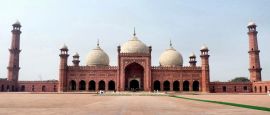Pakistan - Money
Currency & Money
The Pakistani Rupee (PKR; symbol Rs) banknotes are in denominations of Rs5,000, 1,000, 500, 100, 50, 20 and 10. Coins are in denominations of Rs10, 5, 2 and 1.
Credit cards are accepted in Pakistan, but their usage is not as widespread as in many other countries. Digital payment options are primarily concentrated in large urban centres, while cash remains essential for day-to-day transactions.
ATMs are widely available in major cities like Karachi, Lahore, Islamabad, and other urban centres across Pakistan. They are operated by most major banks and generally accept international cards, particularly those on the Visa and Mastercard networks.
Importing foreign currency: Visitors entering Pakistan are allowed to carry unlimited foreign currency, but amounts exceeding USD 10,000 (or its equivalent) must be declared to customs upon arrival.
Exporting foreign currency: When leaving Pakistan, travellers can take out a maximum of USD 10,000 (or its equivalent in other foreign currencies).
Exporting local currency: Residents and visitors are restricted to carrying a maximum of PRK 10,000 out of the country.
Reputable currency exchange companies are concentrated in cities, so plan ahead if you are visiting remote areas.
The most widely accepted foreign currency in Pakistan is the US Dollar (USD). Many hotels, larger shops, and travel agencies in major cities may accept USD, but it's always best to carry Pakistani Rupees (PKR) for day-to-day transactions. Other currencies, like the Euro (EUR) and British Pound (GBP), are also commonly exchanged at banks and currency exchange offices.
Do you have any Feedback about this page?
© 2025 Columbus Travel Media Ltd. All rights reserved. No part of this site may be reproduced without our written permission, click here for information on Columbus Content Solutions.




 You know where
You know where